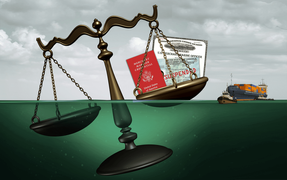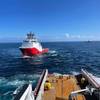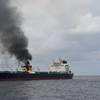The state Coastal Commission and a national environmental group sued the Navy over its refusal to take certain precautions to protect marine mammals during military training exercises off the coast of San Diego, reported the Union Tribune.
While the commission's legal action is a rarity, the Natural Resources Defense Council already had sued the Navy four times over its use of high-intensity sonar.
In separate lawsuits filed Thursday, the commission and the council want the Navy to adopt more stringent safeguards for whales, dolphins and other marine mammals, which can be injured or killed by sonar. The sound waves, which travel hundreds of miles across water, are used to track submarines and surface ships.
Navy officials could not be reached for comment on the lawsuits. In the past, they said the requested measures would compromise military training.
Commission leaders said their lawsuit is aimed at preserving the agency's authority under the Coastal Zone Management Act, which allows it to review federal projects that may affect resources within the state's 3-mile ocean jurisdiction.
The commission's action – it has filed suit less than 10 times over its 34-year history – was announced during a news conference in Santa Monica.
Sonar used by the U.S. and other countries' navies have injured or killed marine mammals, according to research by environmental organizations and the National Oceanic and Atmospheric Administration.
The U.S. Navy's sonar use during previous training off Hawaii, the Bahamas, the Canary Islands and Greece caused whales and dolphins to beach themselves and die.
Researchers aren't sure how sonar causes marine mammals, especially deep-diving beaked whales, to beach themselves.
One theory is that sonar frightens or causes pain inside the animals during their descent. They then surface too quickly, resulting in an air embolism in their bloodstream, or what divers call decompression sickness.
Navy officials said they would follow 29 procedures they consider appropriate for protecting marine mammals during sonar maneuvers.
Those measures include posting observers on the decks of ships and in helicopters to watch for marine mammals. The Navy said it would turn down the volume of its sonar in specified increments, depending on how close the animalsapproach.
.
Source: Union-Tribune
Sponsored Content
Evaluating Marine License Insurance Providers

Revolutionized Fleet Management with ABS Wavesight Nautical Systems™ Mobile

May 2024
 Read the Magazine
Read the Magazine

 Read the Magazine
Read the Magazine
This issue sponsored by:

MARAD’s Centers of Excellence: Addressing Maritime Workforce Needs and Preparing the Next Generation
Subscribe for
Maritime Reporter E-News
Maritime Reporter E-News is the maritime industry's largest circulation and most authoritative ENews Service, delivered to your Email five times per week









